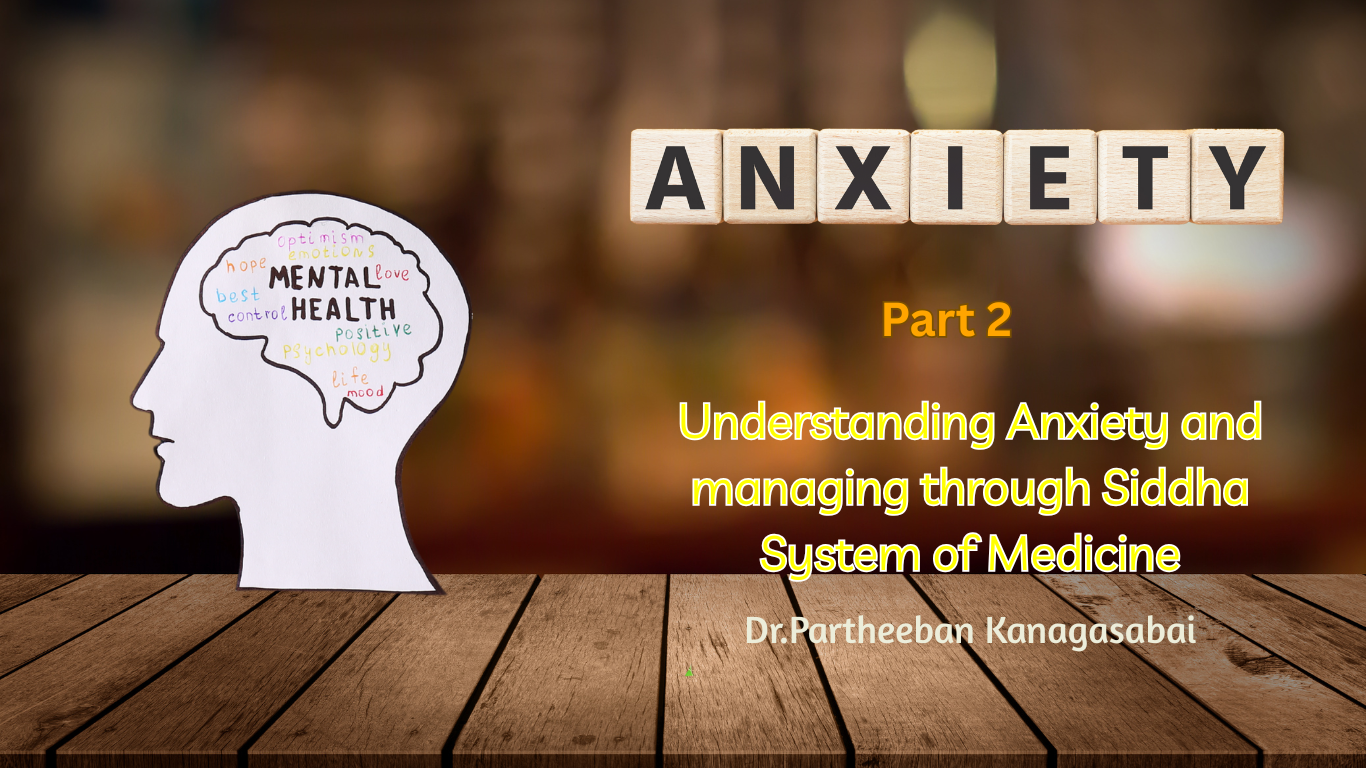
Siddha Medicine Techniques to naturally ease Anxiety Symptoms and Support Mental Health
In this article we are going to have a look at anxiety and understand it in a better way and then how are we going to manage the different forms of anxiety through Siddha System of medicine. So a good theory leads to a good practice.
How Anxiety Can Be Managed
1. Counseling / Psychotherapy
- ❖ This is the safe form
- ❖ Talking to people who are better in their domain, such as therapists, counselors, or mental health professionals.
2. Self-Help
Includes many approaches:
- ❖ Listening to a good speech or wise advice.
- ❖ Reading books
- ❖ Listening to music
- ❖ Eating good food
- ❖ Breathing exercises
- ❖ Disciplined living
3. Medication (Last Alternative)
Some people need medication, and this cannot be denied. It should be used carefully, with an exit plan in mind.
General Tips to Manage Anxiety
1. Information Control
- ❖ LLimit unnecessary information
- ❖ Reading books
- ❖ Avoid constant news channels
- ❖ Stay away from gossip
- ❖ Don’t allow yourself to be bombarded with data
2. Positive Mindset
- ❖ Don’t always assume only negative things will happen.
- ❖ Miracles do happen — this belief must be cultivated.
- ❖ Affirmations help immensely.
3. Balance Work and Relaxation
- ❖ Don't get stuck in a constant work loop
- ❖ Make time to relax in a healthy way.
4. Physical Activity
- ❖ Yoga, gym, jogging, or any exercise helps immensely.
- ❖ Some health imbalances may lead to anxiety and need to be addressed.
- ❖ Good sleep is crucial.
5. Lifestyle Tools
- ❖ Maintain a journal
- ❖ Limit social media.
- ❖ When Medication Is Needed
SSRIs and Benzodiazepine
Common options include SSRIs and benzodiazepines.
Issue with benzodiazepines:
- ❖ Once people get used to them, they don’t want to stop.
- ❖ There is a risk of addiction
For example:
The UK (population: 68 million) issues 12 million prescriptions for benzodiazepines per year.
Around 1.5 million people are addicted.
Just 6 weeks of usage may lead to addiction
Guideline
There is no harm in using medications when necessary.
But there must be an exit plan.
Don't depend constantly on medication.
Combine medications with:
- ❖ Yoga
- ❖ Meditation
- ❖ Breathing techniques
- ❖ Good diet
- ❖ Social life
- ❖ Yoga
Traditional Remedies (Siddha/Herbal Options)
Amukkara
- ❖ Dose: 2g to 4g
- ❖ Helps immensely in managing anxiety.
Sarpagandha
- ❖ Useful for hypertension (common among those with anxiety).
- ❖ Has great value when used properly.
Valuluvai (Celastrus paniculatus)
- ❖ Especially helpful for autism and anxiety
- ❖ Decoctions or herbal formulations are beneficial.
sankupoo (Convolvulus pluricaulis)
- ❖ Mood stabilize.
- ❖ Helps in balancing emotional states.
Jatamansi (Valeriana wallichii)
- ❖ A powerful anxiolytic herb..
- ❖ "It's a wonderful drug—you can have it as blue tea or in other forms."
Combination Herbal Formulas
Depending on individual needs, a custom blend of herbs like Ashwagandha, Sarpagandha, Walu, Shankhpushpi, and Jetamasi can be selected.
Nutritional Support for Mental Health
The Gut-Brain Connection
Diet significantly impacts mood and anxiety
Avoid or limit:
- ❖ Artificial colors
- ❖ Preservatives
- ❖ Flavor enhancers
- ❖ Additives
- ❖ Excess sugar and sugary drinks
- ❖ Preservatives
Common Nutritional Deficiencies
Vitamin D and Vitamin B12 deficiencies are common in people with anxiety.
These can be easily addressed with supplementation
Recommended Nutrient-Rich Foods
- ❖ Dark chocolate(high-cocoa content)
- ❖ Omega-3 fatty acids (e.g., flaxseed, fatty fish)
- ❖ Avocados
- ❖ Coconut (oil, milk, etc.)
- ❖ Healthy fats overall support emotional well-being.
External Therapies to Support Anxiety Relief
The Role of Skin and Touch
Skin is the largest sense organ — therapies that involve touch are deeply comforting.
Massage therapy
Neck, shoulder, and back massages
Abdomen/liver area massage for deeper relaxation
Relieves muscle stiffness, especially in anxious individuals
Foot Therapy
Foot bath:Overthinking can be grounded and dissipated into the water medium through the feet.
Foot massage: Calms the nervous system.
Shirodhara (Ayurvedic Oil Therapy)
Duration: Typically 7, 14, or 21 days
Helps shift alpha wave dominance from the back of the brain to the front, where it should naturally reside.
This improves calmness and clarity in people with anxiety.
Completely non-invasive and safe.
Mind-Body Integration Techniques
Posture Awareness
- ❖ Psychological Pillow: Some anxious individuals lie stiffly on the bed, with heads elevated due to tension.
- ❖ This stiffness, especially in the neck and shoulders, must be relaxed
Breathing Practices
Most anxious individuals practice shallow breathing.
Deep breathinghelps:
- ❖ Balance mood
- ❖ Promote calmness
- ❖ Improve oxygen flow and awareness
Chakra Meditations & Structured Practices
- ❖ Chakra meditation: Balances inner energy centers.
- ❖ Breathwork: Deepens the relaxation response.
- ❖ Yoga and physical routines: Provide a structured outlet for energy and emotion.